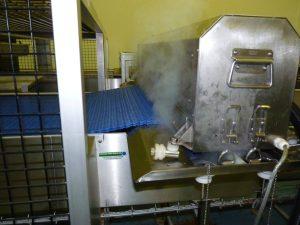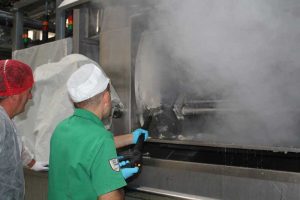Conveyor systems are an integral part of numerous industries, including manufacturing, food processing and logistics. These systems are utilised to transport materials and products from one area to another, making them essential for the smooth operation of a business. However, over time, conveyor belts can become dirty and contaminated with debris, dust and other particles.
This can lead to a range of issues, including reduced efficiency, increased wear and tear on the equipment and potential safety hazards. Regular conveyor cleaning is therefore essential to ensure that these systems continue to operate at their optimal level. Regular conveyor cleaning helps to prevent the accumulation of debris and contaminants on the belts and other components of the system.
This not only helps to maintain the efficiency of the conveyor, but also reduces the risk of damage to the equipment. Furthermore, clean conveyors are less likely to cause contamination of products being transported, which is particularly important in industries such as food processing where hygiene is paramount. By implementing a regular cleaning schedule, businesses can ensure that their conveyor systems continue to operate at their best, reducing downtime and maintenance costs in the long term.
Summary
- Regular conveyor cleaning is crucial for maintaining a safe and efficient working environment
- Conveyor cleaning can significantly improve productivity by reducing downtime and maintenance
- Proper conveyor cleaning plays a vital role in ensuring the safety of workers and preventing accidents
- Best practices for conveyor cleaning include using the right cleaning equipment and following manufacturer guidelines
- Implementing a regular conveyor cleaning schedule is essential for preventing build-up and maintaining optimal performance
- Conveyor cleaning can extend the longevity of equipment and reduce the need for costly repairs or replacements
- Regular conveyor cleaning can lead to significant cost savings by reducing maintenance and downtime expenses
How Conveyor Cleaning Improves Productivity
Conveyor systems play a crucial role in the productivity of many businesses. They are used to transport materials and products efficiently and quickly, helping to streamline processes and reduce manual handling. However, when conveyor belts become dirty and contaminated, they can become less efficient, leading to slower production times and reduced productivity.
Regular conveyor cleaning is therefore essential to ensure that these systems continue to operate at their best and contribute to the overall productivity of a business. By keeping conveyor belts clean and free from debris, businesses can ensure that their systems continue to operate at maximum efficiency. This helps to reduce the risk of bottlenecks and delays in production, allowing for a smoother workflow and increased output.
In addition, clean conveyor belts are less likely to cause damage to products being transported, reducing the risk of waste and rework. By implementing a regular cleaning schedule, businesses can therefore improve their overall productivity and maintain a competitive edge in their industry.
The Role of Conveyor Cleaning in Ensuring Safety

Safety is a top priority in any industry, and conveyor systems present a range of potential hazards if not properly maintained. Dirty and contaminated conveyor belts can lead to slip and trip hazards for workers, as well as potential damage to products being transported. In addition, build-up of debris on the belts can lead to increased wear and tear on the equipment, potentially leading to mechanical failures and safety risks.
Regular conveyor cleaning is therefore essential to ensure the safety of workers and the smooth operation of the system. By keeping conveyor belts clean and free from debris, businesses can reduce the risk of slip and trip hazards for workers. This helps to create a safer working environment and reduces the risk of accidents and injuries.
In addition, clean conveyor belts are less likely to cause damage to products being transported, reducing the risk of contamination and potential safety hazards. By implementing a regular cleaning schedule, businesses can therefore ensure the safety of their workers and maintain a healthy and productive working environment.
Best Practices for Conveyor Cleaning
When it comes to conveyor cleaning, there are a number of best practices that businesses should follow to ensure that their systems continue to operate at their best. Firstly, it’s important to use the right cleaning equipment and products for the job. This may include specialised conveyor belt cleaners, as well as appropriate cleaning solutions that are safe for use in the specific industry.
In addition, businesses should establish a regular cleaning schedule to ensure that conveyor belts are cleaned at appropriate intervals. Another best practice for conveyor cleaning is to inspect the system regularly for any signs of wear or damage. This may include checking for worn or damaged belts, as well as any build-up of debris or contaminants.
By identifying potential issues early on, businesses can take proactive steps to address them before they become more serious problems. Finally, it’s important to train staff on the importance of conveyor cleaning and provide them with the necessary tools and equipment to carry out the task effectively.
Implementing a Regular Conveyor Cleaning Schedule
Implementing a regular conveyor cleaning schedule is essential for ensuring that these systems continue to operate at their best. Businesses should establish a cleaning schedule that takes into account the specific needs of their conveyor systems, including factors such as the type of materials being transported and the operating environment. This may involve daily, weekly, or monthly cleaning tasks, depending on the level of use and potential for contamination.
In addition to establishing a regular cleaning schedule, businesses should also ensure that staff are trained on how to carry out the cleaning tasks effectively. This may involve providing training on the use of cleaning equipment and products, as well as best practices for inspecting the system for signs of wear or damage. By implementing a regular cleaning schedule and providing staff with the necessary training, businesses can ensure that their conveyor systems continue to operate at their best and contribute to the overall productivity and safety of the workplace.
The Impact of Conveyor Cleaning on Equipment Longevity

Regular conveyor cleaning has a significant impact on the longevity of equipment. Dirty and contaminated conveyor belts can lead to increased wear and tear on the system, potentially leading to mechanical failures and reduced lifespan of the equipment. By keeping conveyor belts clean and free from debris, businesses can reduce the risk of damage to the equipment and extend its overall lifespan.
In addition to reducing wear and tear on the equipment, regular conveyor cleaning also helps to prevent corrosion and other forms of damage that can occur as a result of build-up of debris on the belts. This helps to maintain the integrity of the equipment and reduce the risk of costly repairs or replacements in the long run. By implementing a regular cleaning schedule, businesses can therefore ensure that their conveyor systems continue to operate at their best and contribute to the overall efficiency and productivity of the workplace.
The Cost Savings of Regular Conveyor Cleaning
Regular conveyor cleaning can lead to significant cost savings for businesses in the long run. By maintaining clean conveyor belts, businesses can reduce the risk of damage to products being transported, as well as potential contamination issues that can lead to waste and rework. In addition, clean conveyor belts are less likely to cause damage to the equipment itself, reducing the risk of costly repairs or replacements.
Furthermore, regular conveyor cleaning helps to reduce downtime and maintenance costs associated with dirty or damaged equipment. By implementing a regular cleaning schedule, businesses can ensure that their conveyor systems continue to operate at their best, reducing the risk of mechanical failures and associated costs. In addition, clean conveyor belts are more efficient, leading to increased productivity and output for businesses.
Overall, regular conveyor cleaning leads to cost savings in terms of reduced waste, lower maintenance costs, and increased productivity for businesses across a range of industries. In conclusion, regular conveyor cleaning is essential for ensuring that these systems continue to operate at their best. By maintaining clean conveyor belts, businesses can improve productivity, ensure safety in the workplace, extend equipment longevity, and achieve significant cost savings in the long run.
Implementing a regular cleaning schedule and following best practices for conveyor cleaning are key steps towards maintaining efficient and productive operations across a range of industries.










